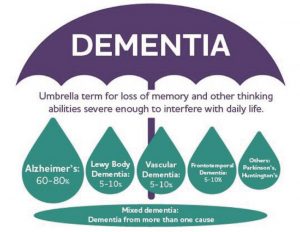By Amy Hoffmann Schenk, RN, BSN, MS Ed, Community Engagement Lead
Neuropsychiatric Research Center of SW Florida


These are some of the questions that are common around the topic of memory loss. According to the National Institute of Health (NIH), while age is a the most important known risk factor for the disease, old age does not cause Alzheimer’s disease. Alzheimer’s disease is the most common form of dementia, and it’s estimated that 1/9 (one in nine people) aged 65 and older have Alzheimer’s. That roughly translates to approximately 6.7 million people in the United States who have Alzheimer’s disease, per the 2023 Alzheimer’s Association facts and figures document. Here in Florida, it is estimated that around 580,000 people are living with Alzheimer’s disease.
It is quite common for people to get the terms Alzheimer’s and dementia confused. The best way to describe dementia is that dementia is a syndrome, characterized by a decline in mental functioning. Thinking, remembering, and reasoning are all impacted, and these changes are typically not reversible. In addition, to have a diagnosis of dementia, these changes in cognition are significant enough to interfere with your daily life.
Alzheimer’s disease is a type of dementia, and estimated to be between 60 – 80% of all cases of dementia. Alzheimer’s disease is progressive (it continues to get worse), neurodegenerative (nerve cells in the brain, called neurons, become damaged and lose function and die), and while there are a number of early warning signs of Alzheimer’s disease, decline in short term memory is common. There are many different types of dementia. Vascular dementia, Lewy body dementia, Frontotemporal dementia and mixed dementia are several of the most common types.
Why is early detection important? Currently, early detection and screening procedures are very common for a variety of illnesses. You may have already had one or more of these types of screening. Cholesterol screening, Pap tests, fecal occult blood testing, colonoscopy, mammography, diabetes screening tests and the PSA (prostate specific antigen) blood test are all examples of screening tests. Having a memory screen should be a part of an annual health checkup.
You may be wondering why you should have a memory screen. There are a variety of reasons that having a memory screen is important. One of the main reasons is to find out why someone is experiencing memory concerns. There are a variety of different conditions that can impact one’s memory that are reversible and/or treatable. Conditions such as thyroid issues, vitamin B12 deficiency, sleep apnea, depression, medication interactions, excessive alcohol use, even significant stress and anxiety can cause memory issues, These causes can be addressed. Even if you are not currently concerned about your memory, you can be proactive with your brain health by having a baseline memory screen done.
Regular memory screening may be beneficial in the early detection of Alzheimer’s disease and other forms of dementia. The risk of dementia increases with age. When diagnosed early enough, a combination of lifestyle changes and medical treatments can potentially delay the progression. The information obtained from the screening is not a diagnosis but will better enable you to take charge of your brain health.
What is a memory screen? Memory screening promotes healthier aging and is one thing you can do to try to prevent or delay the onset of symptoms associated with Alzheimer’s. Annual memory testing is highly recommended for adults ages fifty or older, or even earlier if you are experiencing memory problems that worry you. It is a positive, proactive step you can take right now to take charge of your brain health. You will get a free cognitive assessment, plus education about aging, memory, lifestyle factors and referrals to appropriate community resources.
To make it easy to get a memory screen, the Neuropsychiatric Research Center of Southwest Florida (NPRC) will be offering free memory screens on August 8th and 9th. The screenings will take place at 14271 Metropolis Avenue, Fort Myers, 33912. To schedule your free memory screen, contact our office at 239-939-7777. Please bring a list of your current medications to your appointment. The screening and all services provided at our center are at no cost to you and we do not ask for any insurance information. At the Neuropsychiatric Research center there are many cutting edge clinical studies that are focused on addressing memory issues.
Contact NPRC at 239-939-7777 today for your free memory screen.
References:
Lee S, Huang H, Zelen M. Early detection of disease and scheduling of screening examinations. Stat Methods Med Res. 2004 Dec;13(6):443-56. doi: 10.1191/0962280204sm377ra. PMID:
Diagnosing Alzheimer’s: How Alzheimer’s is diagnosed – Mayo Clinic
https://www.census.gov/quickfacts/leecountyflorida
 Southwest Florida's Health and Wellness Magazine Health and Wellness Articles
Southwest Florida's Health and Wellness Magazine Health and Wellness Articles

